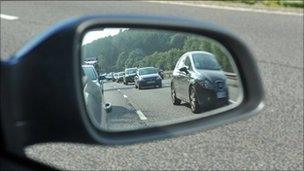Fines planned for careless driving
- Published
- comments
Examples of careless driving that might attract a fine under the new rules
Police will get powers to fine careless drivers, rather than taking them to court, as part of a government strategy to make Britain's roads safer.
Ministers say motorists who tail-gate, undertake or cut others up often go unpunished and that introducing instant penalties would be more efficient.
Offenders would get a fine of at least £80 and three points on their licence.
Critics say the approach - likely to be introduced in 2012 in England, Scotland and Wales - is too simplistic.
Currently motorists who have driven in a careless manner have to be prosecuted through the courts. Under the new plans, they will still have that option should they contest the offence.
Transport Secretary Philip Hammond released the new strategy, external for England, Scotland and Wales on Wednesday.
The proposals still have to go through Parliament.
Plans for an 80mph speed limit for motorways and reduced speeds on country roads are not included in the legislation, but are part of ongoing plans.
Drug crackdown
Mr Hammond told the BBC that the fines would not change the government's approach towards serious offenders but were for "low-level" offences.
He said: "We're going to crack down on the most reckless and dangerous drivers, we're going to support those who are basically law-abiding but who perhaps have an occasional lapse."
He added that he hoped the plans would alleviate the pressure on police officers.
"We hope to allow them effectively and efficiently to address poor driving skills and behaviour on our roads, while at the same time freeing up court and police resources to tackle the really dangerous drivers that are the real problem on our roads."
The Department for Transport (DfT) said it would also include a clampdown on drug-driving and the closing of loopholes that allow people to escape drink-driving charges.
Disqualified drivers would have to undergo retraining, and possibly take another test, before they got their licence back.
Courts would be encouraged to make more use of their powers to seize vehicles for the most serious offences.
There will be support for new drivers who need to hone their driving skills, and wider range of retraining and education courses for cases of less serious offences.
In some cases, motorists will be spared the penalty and points if they agree to undergo training, at their own expense.
'Greatest danger'
A DfT spokesman said: "By giving the police the tools to deal with those who present the greatest danger to others we can make our roads even safer.
"While seeking to do everything possible to tackle the most dangerous drivers, the strategy will also help the responsible majority to improve their driving.
"This is the government's twin approach to improving road safety."

Currently motorists who drive carelessly have to be prosecuted through the courts
But the Institute of Advanced Motorists said the fines were not necessarily the right approach for careless driving because, unlike speeding, cases were often not clear-cut.
It also said their introduction could make police reluctant to enter into lengthy prosecutions even in more serious cases.
Professor Stephen Glaister, director of the RAC Foundation, agreed that the proposals should help tackle anti-social driving but expressed concern over whether the police had the necessary resources.
He said: "The three things needed to make these plans work are enforcement, enforcement, enforcement. With police services being cut it is far from certain the desired results can be achieved. Without adequate enforcement there is no strategy."
'Slap on the wrist'
Julie Townsend, campaign director at Brake, the road safety charity, expressed her "concern" at whether the level of the fines would be enough of a deterrent for motorists.
She said: "You can be fined £1,000 for dropping litter yet we're talking here about committing crimes behind the wheel that all too often lead to injury and death. To many people £100 is little more than a slap on the wrist."
Robert Gifford, chief executive of the Parliamentary Advisory Council for Traffic Safety, gave the plans a "cautious welcome".
He said that the fines would not remove much of the burden from police officers.
"The main argument seems to be that it'll reduce police bureaucracy and therefore more people will be given a fixed penalty. But the police will still have to gather evidence, as the person will have the right to challenge it in court."
Mr Gifford added: "We don't want it to backfire in the way that speed camera funding did, if people think the police are doing it simply to raise money."
- Published20 April 2011
- Published11 April 2011
- Published9 April 2011